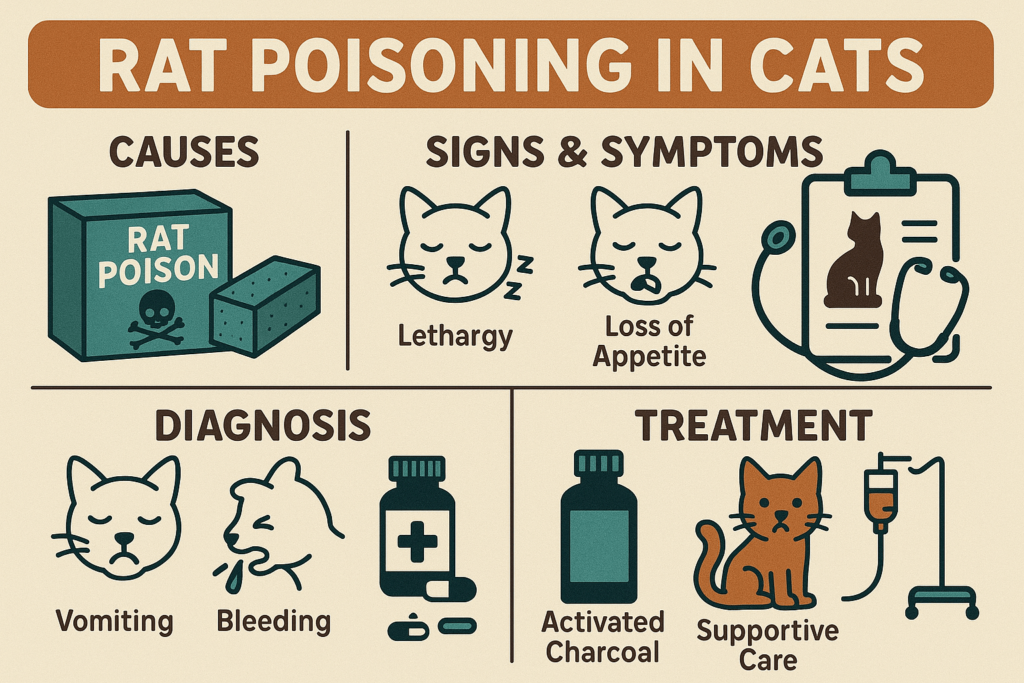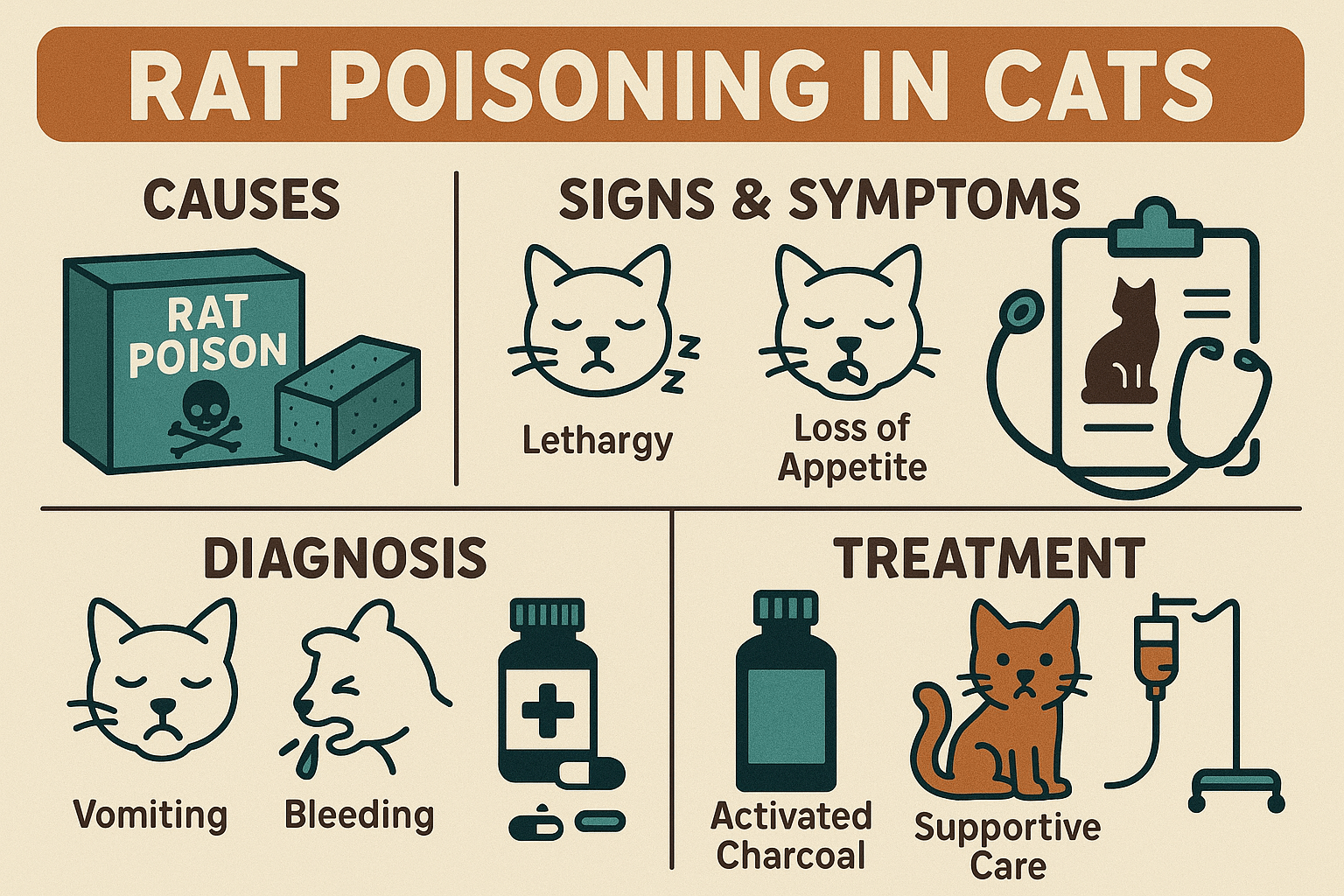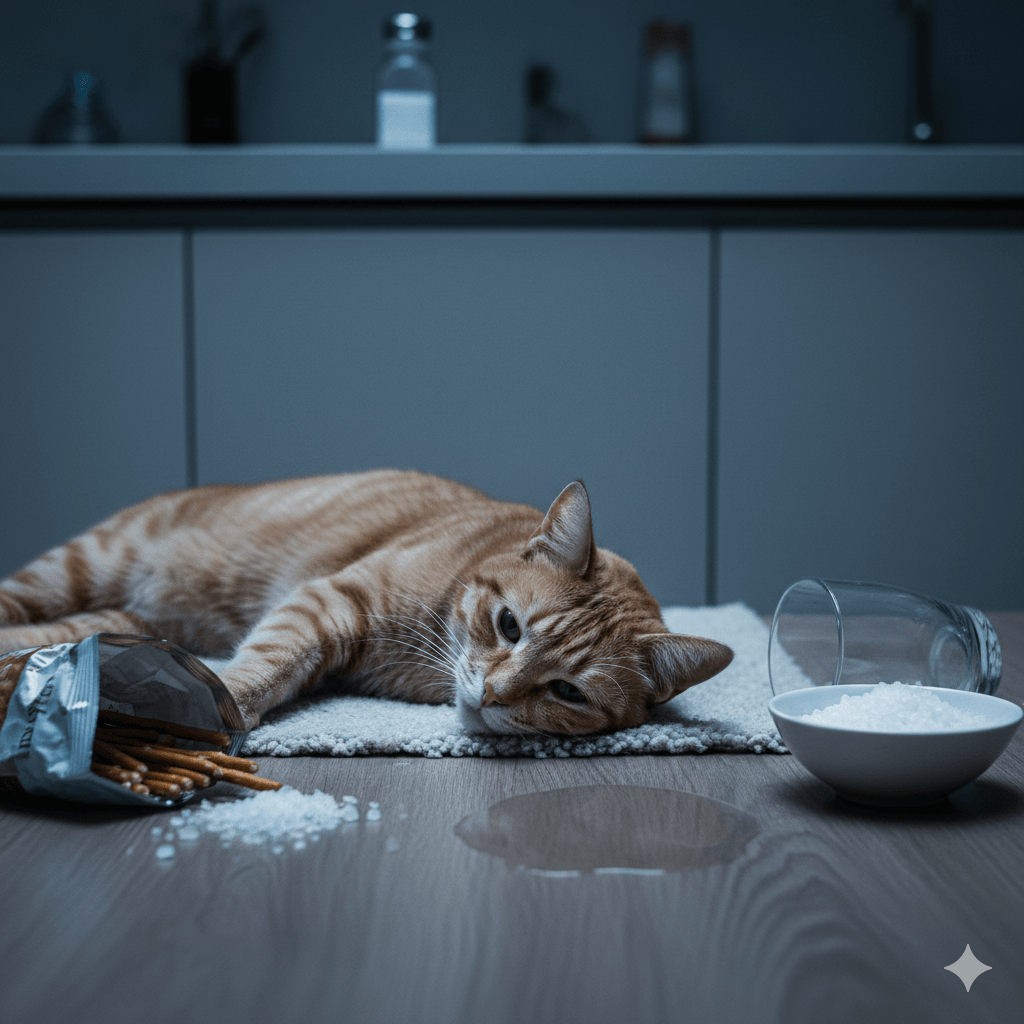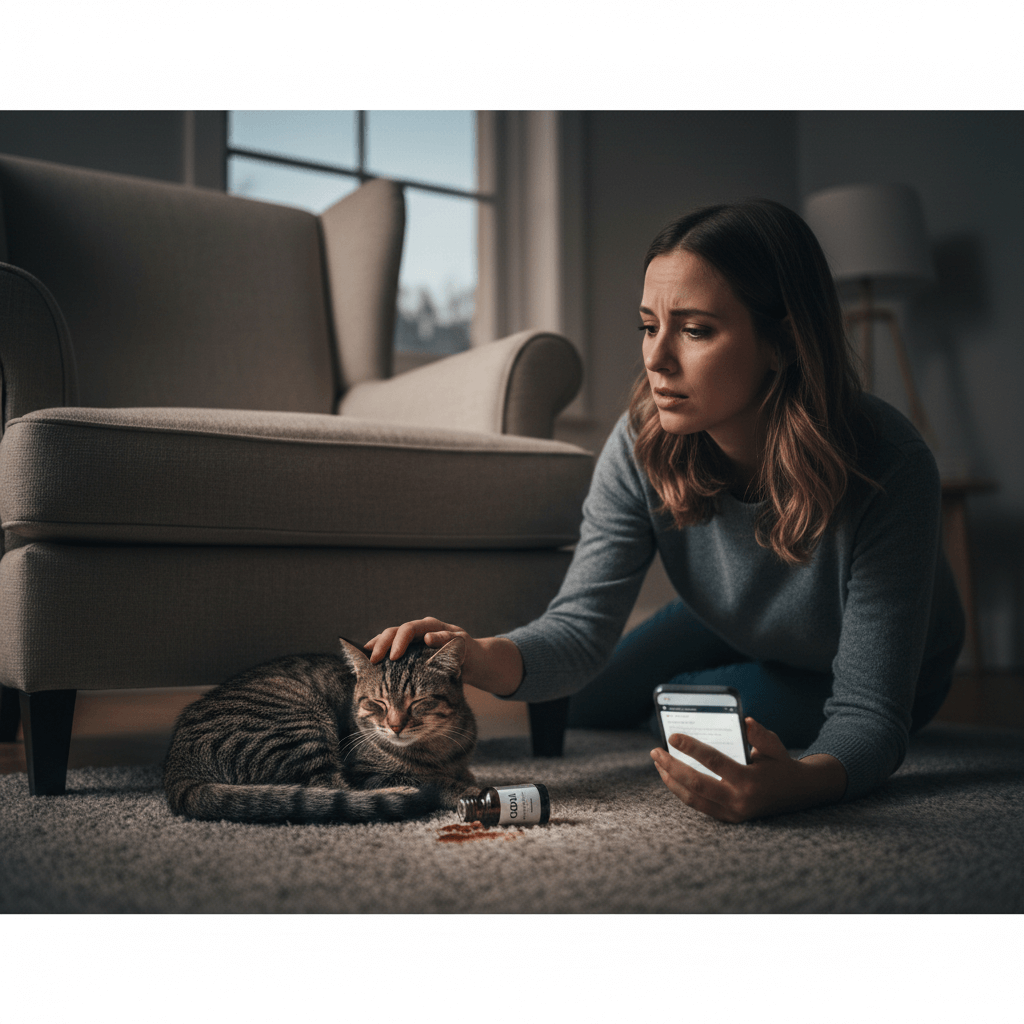Rat Poisoning in Cats: Understanding the Risks and Solutions
Cats are naturally curious creatures, often exploring their surroundings with little regard for potential dangers. Unfortunately, this curiosity can lead to accidental exposure to harmful substances, such as rat poison. Rat poisoning in cats is a serious and potentially life-threatening issue that every pet owner should be aware of. Whether your cat ingests the poison directly or indirectly through prey, understanding the risks, symptoms, and treatment options is crucial for ensuring their safety. In this blog post, we’ll delve into everything you need to know about rat poisoning in cats, from prevention to emergency care, so you can keep your feline friend safe and healthy.
Common Types of Rat Poisons and Their Effects on Cats
Rat poison comes in various forms, each designed to eliminate rodents but posing significant risks to pets like cats. Knowing the types of poisons and how they affect your cat’s body can help you identify potential dangers.
Anticoagulant Rodenticides:
These poisons interfere with blood clotting, leading to internal bleeding. Symptoms may take days to appear, making early detection challenging.Bromethalin:
Bromethalin affects the nervous system, causing symptoms like tremors, seizures, and paralysis. It acts quickly and requires immediate intervention.Cholecalciferol (Vitamin D3):
This poison increases calcium levels in the blood, leading to kidney failure and other severe complications if left untreated.Zinc Phosphide:
When ingested, zinc phosphide releases toxic gas in the stomach, causing vomiting, abdominal pain, and respiratory distress.Non-Anticoagulant Poisons:
These include chemicals like strychnine, which cause muscle spasms and convulsions, endangering your cat’s life within hours.
Understanding these poisons and their effects allows you to act swiftly if your cat is exposed, minimizing the risk of long-term harm.

Signs and Symptoms of Rat Poisoning in Cats
Recognizing the signs of rat poisoning in cats is critical for seeking timely veterinary care. Symptoms vary depending on the type of poison but often include alarming physical and behavioral changes.
Lethargy and Weakness:
A poisoned cat may appear unusually tired or struggle to move, indicating possible internal damage.Bleeding or Bruising:
Anticoagulant poisons can cause unexplained bleeding from the gums, nose, or rectum, as well as bruising under the skin.Difficulty Breathing:
Respiratory issues may arise from certain poisons, such as zinc phosphide, signaling a medical emergency.Seizures or Tremors:
Neurological symptoms like seizures or uncontrollable shaking are common with bromethalin or strychnine exposure.Increased Thirst and Urination:
Cholecalciferol poisoning often leads to excessive thirst and urination due to kidney stress.
If you notice any of these symptoms, seek veterinary attention immediately to prevent further complications.
Check this guide 👉Symptoms of Ammonia Poisoning from Cat Urine: Best 7 Tips!
Check this guide 👉Permethrin Cat Toxicity: Best 7 Expert Tips!
Check this guide 👉Is Ivy Toxic to Cats? Best 7 Expert Tips!
Prevention Tips for Rat Poisoning | Immediate Actions if Poisoning Occurs |
|---|---|
Store poisons securely out of reach | Contact your vet or an emergency clinic |
Use pet-safe pest control methods | Identify the type of poison involved |
Supervise outdoor exploration | Do not induce vomiting unless instructed |
Keep your home rodent-free naturally | Bring the poison packaging to the vet |
Educate family members about risks | Monitor your cat closely for symptoms |
Steps to Take If You Suspect Rat Poisoning in Your Cat
If you suspect your cat has been exposed to rat poison, acting quickly can make all the difference in their recovery. Follow these steps to ensure your cat receives the best possible care.
Remove Your Cat from the Source:
If you find your cat near poison, gently move them away to prevent further ingestion.Call Your Veterinarian Immediately:
Time is critical—inform your vet about the situation and provide details about the poison if known.Do Not Administer Home Remedies:
Avoid giving milk, food, or medications without professional guidance, as they may worsen the condition.Collect Evidence:
Bring the poison packaging or sample to the vet to help them determine the appropriate treatment.Monitor Vital Signs:
Keep an eye on your cat’s breathing, heart rate, and behavior while transporting them to the clinic.
Swift action and clear communication with your vet increase the chances of a successful recovery for your cat.
Preventing Rat Poisoning in Cats: Proactive Measures
Prevention is always better than cure when it comes to rat poisoning in cats. Taking proactive measures can significantly reduce the risk of accidental exposure.
Choose Pet-Safe Pest Control Products:
Opt for humane traps or natural deterrents instead of chemical poisons to keep your home rodent-free.Secure Storage of Hazardous Substances:
Store all pesticides, rodenticides, and cleaning supplies in locked cabinets or areas inaccessible to pets.Supervise Outdoor Activities:
Keep a close eye on your cat during outdoor adventures to prevent contact with unknown toxins.Regularly Inspect Your Property:
Check for signs of rodent activity and address infestations promptly using safe methods.Educate Family Members and Neighbors:
Ensure everyone in your household—and nearby neighbors—is aware of the dangers of rat poison to pets.
By implementing these precautions, you create a safer environment for your cat to thrive in.
Common Misconceptions About Rat Poisoning
Misinformation about rat poisoning can lead to dangerous delays in treatment. Clearing up these misconceptions ensures you’re better prepared to protect your cat.
Myth: Cats Won’t Eat Rat Poison Directly:
While true in most cases, cats can accidentally ingest poison by grooming themselves after walking through contaminated areas.Myth: Only Outdoor Cats Are at Risk:
Indoor cats can also be exposed through prey animals or improperly stored products.Myth: All Rat Poisons Work the Same Way:
Different poisons have varying mechanisms of action, requiring tailored treatments.Myth: Inducing Vomiting Always Helps:
For certain poisons, inducing vomiting can worsen the situation; always consult a vet first.Myth: Cats Recover Fully Without Treatment:
Untreated poisoning can cause irreversible damage or death, highlighting the importance of professional care.
Dispelling these myths empowers you to take informed actions in an emergency.
Safe Alternatives to Rat Poison
For households with pets, finding pet-safe alternatives to traditional rat poison is essential. These options reduce the risk of accidental poisoning while addressing rodent problems effectively.
Humane Traps:
Live traps allow you to capture rodents without harming them, enabling relocation instead of extermination.Natural Repellents:
Peppermint oil, ultrasonic devices, and predator urine sprays deter rodents without toxic chemicals.Seal Entry Points:
Blocking cracks, holes, and gaps prevents rodents from entering your home in the first place.Maintain Cleanliness:
Proper food storage and regular cleaning eliminate attractants for rodents.Consult Pest Control Experts:
Professional services offer pet-safe solutions tailored to your specific needs.
Switching to these alternatives creates a safer environment for both your family and pets.
How to Create a Cat-Friendly Home Environment
A cat-friendly home minimizes hazards and promotes your cat’s well-being, reducing the likelihood of accidents like rat poisoning. Here’s how to achieve a harmonious living space.
Designate Safe Zones:
Provide areas where your cat can retreat and relax, free from potential dangers.Pet-Proof Your Home:
Remove or secure items like wires, small objects, and toxic plants that could harm your cat.Use Non-Toxic Cleaning Products:
Switch to eco-friendly cleaners to avoid exposing your cat to harmful chemicals.Offer Enrichment Activities:
Toys, scratching posts, and climbing structures keep your cat entertained and less likely to explore risky areas.Regular Veterinary Check-Ups:
Routine visits help detect health issues early and reinforce preventive care practices.
Creating a cat-friendly home fosters a safe and nurturing environment where your feline companion can thrive.
Frequently Asked Questions About Rat Poisoning in Cats
What should I do if my cat eats rat poison?
Contact your veterinarian immediately and follow their instructions carefully.
Can rat poison kill a cat?
Yes, rat poison is highly toxic and can be fatal if not treated promptly.
How long does it take for symptoms to appear?
Symptoms may appear within hours or days, depending on the type of poison ingested.
Is there an antidote for rat poisoning in cats?
Some poisons have specific treatments, such as vitamin K1 for anticoagulants, but professional care is essential.
Are indoor cats at risk of rat poisoning?
Yes, indoor cats can still be exposed through contaminated prey or accidental access to poisons.
Protecting Your Cat from Rat Poisoning: A Shared Responsibility
Rat poisoning in cats is a preventable tragedy that requires vigilance, education, and swift action. By understanding the risks, recognizing the symptoms, and taking preventive measures, you can safeguard your beloved pet from this silent threat. Remember, your cat relies on you to protect them from harm, and even small efforts—like choosing pet-safe pest control or storing poisons securely—can make a world of difference. Together, let’s ensure our feline companions enjoy long, happy, and toxin-free lives.
Poodle Water Dog: Best 7 Expert Tips! – Discover how Poodles excel in water activities, from swimming to training, and unlock their aquatic potential today.
Salt Poisoning in Cats: Best 7 Expert Tips! – Learn the dangers of salt toxicity, spot symptoms early, and discover how to keep your cat safe from this serious health risk.
Salt Poisoning in Dogs: Best 7 Expert Tips! – Learn the dangers of salt toxicity, recognize symptoms, and discover life-saving steps to protect your dog.
Can Too Much CBD Kill a Cat? Best 7 Expert Tips! – Discover the risks, safe dosages, and signs of CBD toxicity to keep your cat safe and healthy.





